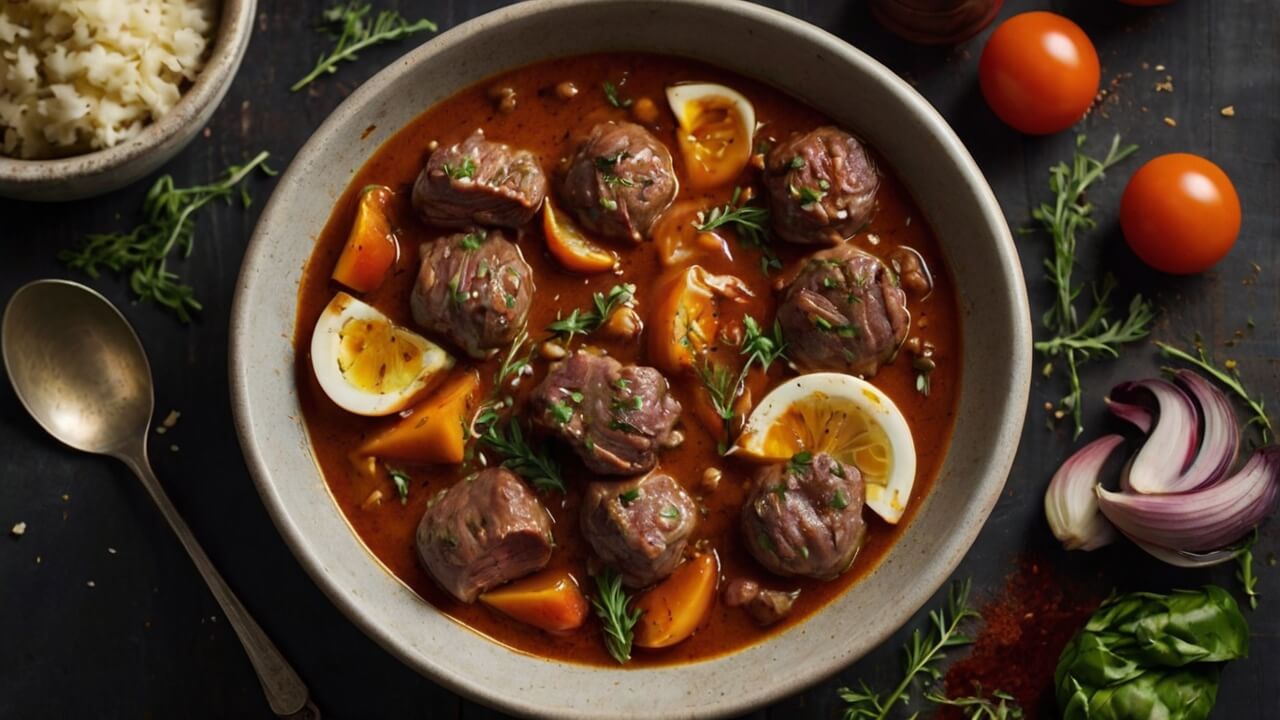Slow cooking is a game-changer for those following the Autoimmune Protocol (AIP) diet. This gentle cooking method not only makes meal preparation incredibly convenient but also helps retain the nutrients in your ingredients.
With an AIP slow cooker recipe, you can simply toss in your compliant ingredients, let them simmer away, and return to a delicious, wholesome meal – no fuss, no stress.
The AIP diet eliminates certain foods that may trigger inflammation or autoimmune reactions. This can make meal planning and preparation quite challenging, especially when you’re already juggling a busy schedule.
Slow cookers offer a lifeline, allowing you to prepare nutrient-dense, flavorful dishes with minimal effort. Simply combine your ingredients in the morning, and by dinnertime, you’ll have a piping hot, AIP-friendly meal waiting for you.
Moreover, slow cooking is an excellent way to retain the valuable nutrients in your ingredients. Unlike other cooking methods that expose foods to high temperatures for extended periods, slow cookers gently simmer your meals, preserving the vitamins, minerals, and enzymes that are often lost during harsh cooking processes.
Beef Recipes
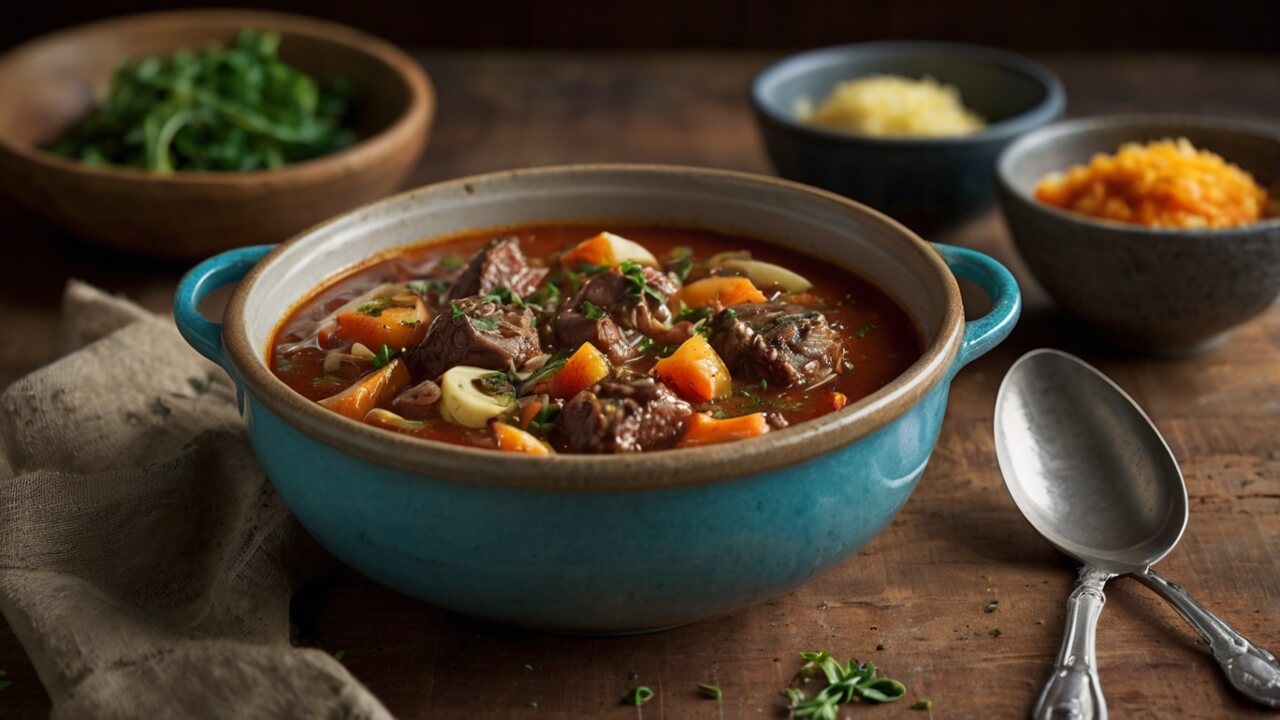
Orange Ginger Slow Cooker Beef
This flavorful dish combines the tangy sweetness of orange with the warmth of ginger, creating a mouth-watering Asian-inspired meal. The slow cooker ensures the beef becomes incredibly tender and infused with delicious flavors.
Ingredients:
- 2 lbs beef chuck roast or stew meat
- 1 orange, juiced and zested
- 2 tbsp grated ginger
- 3 cloves garlic, minced
- 2 tbsp coconut aminos
- 1 tsp fish sauce
- 1/2 tsp sea salt
- 1/4 tsp black pepper
- 2 cups beef broth
- 2 tbsp arrowroot powder (for thickening)
Preparation:
- Place the beef in the slow cooker.
- In a small bowl, whisk together the orange juice, zest, ginger, garlic, coconut aminos, fish sauce, salt, and pepper.
- Pour the mixture over the beef and add the beef broth.
- Cook on low for 8-10 hours.
- In a small bowl, whisk the arrowroot powder with a few tablespoons of the cooking liquid to create a slurry.
- Pour the slurry into the slow cooker and stir to thicken the sauce.
- Serve hot, garnished with sliced green onions or fresh cilantro if desired.
Cooking Time: 8-10 hours on low
Cherry Balsamic Pot Roast
This rich and flavorful pot roast is a perfect comfort food for chilly evenings. The combination of tart cherries and tangy balsamic vinegar creates a delightful sauce that complements the tender beef.
Beef Stew with Cranberries and Rosemary
Hearty and nourishing, this stew is a delightful blend of savory beef, tart cranberries, and fragrant rosemary. The slow cooker allows the flavors to meld together beautifully, creating a comforting and satisfying meal.
Korean Beef Zoodles
Embrace the flavors of Korean cuisine with this delectable dish. Tender beef is cooked in a savory sauce made with coconut aminos, ginger, and garlic, then served over zucchini noodles for a low-carb and AIP-friendly twist.
Pork Recipes
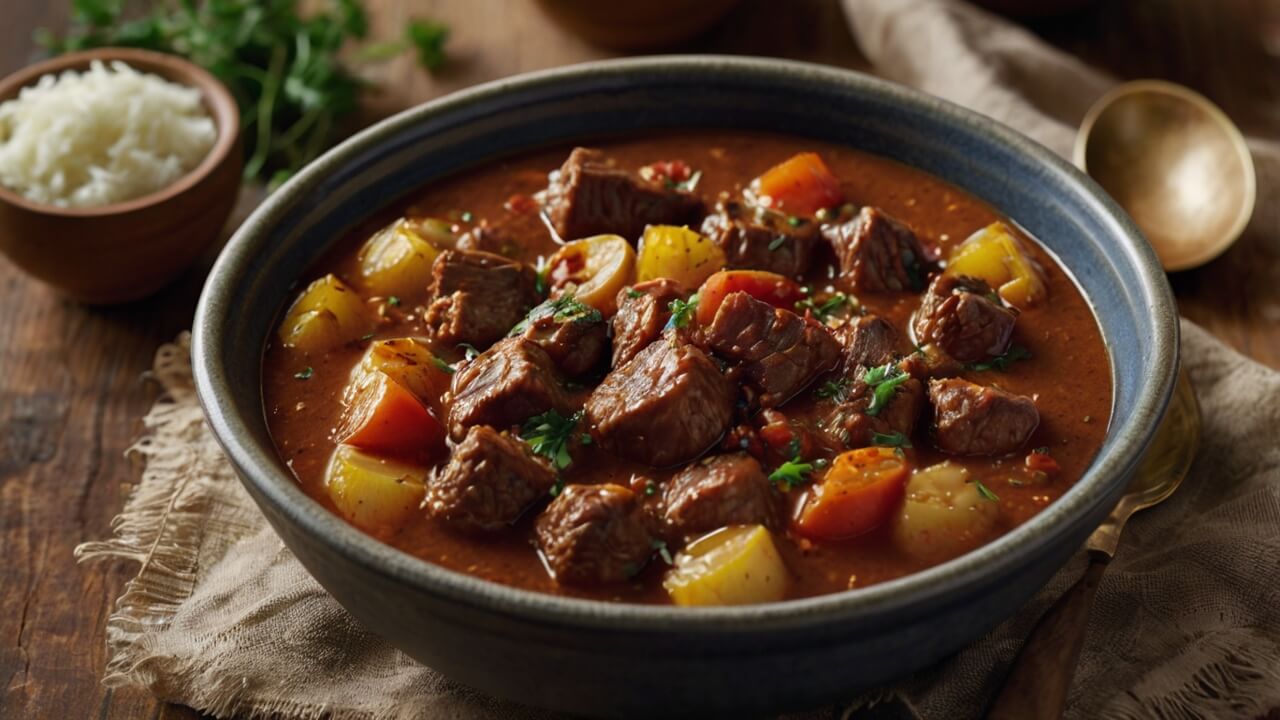
Honey Garlic Pulled Pork
This sweet and savory dish is a crowd-pleaser that’s perfect for gatherings or meal prep. The slow cooker allows the pork to become incredibly tender and infused with the flavors of honey, garlic, and aromatic spices.
Ingredients:
- 3-4 lb pork shoulder or Boston butt
- 1/2 cup honey
- 1/4 cup coconut aminos
- 1/4 cup apple cider vinegar
- 6 cloves garlic, minced
- 1 tsp ground ginger
- 1 tsp salt
- 1/2 tsp black pepper
Instructions:
- Place the pork shoulder in the slow cooker.
- In a small bowl, whisk together the honey, coconut aminos, apple cider vinegar, garlic, ginger, salt, and pepper.
- Pour the sauce over the pork, making sure it’s evenly coated.
- Cook on low for 8-10 hours, or until the pork is fork-tender and easily shreds.
- Remove the pork from the slow cooker and shred it using two forks.
- Toss the shredded pork with the remaining sauce from the slow cooker.
- Serve warm, garnished with sliced green onions or fresh herbs if desired.
Slow Cooker Pulled Pork and Roasted Vegetables
This hearty and flavorful dish combines tender pulled pork with roasted vegetables, making it a complete and satisfying meal. The slow cooker does the heavy lifting, while the oven adds a delightful caramelized flavor to the veggies.
Ingredients:
- 3-4 lb pork shoulder or Boston butt
- 1 cup beef broth or bone broth
- 2 tbsp apple cider vinegar
- 1 tbsp smoked paprika
- 1 tsp garlic powder
- 1 tsp onion powder
- 1 tsp salt
- 1/2 tsp black pepper
- 2 lbs assorted vegetables (e.g., potatoes, carrots, Brussels sprouts, radishes)
- 2 tbsp avocado oil or olive oil
- Fresh herbs for garnish (e.g., parsley, cilantro)
Instructions:
- Place the pork shoulder in the slow cooker and pour in the beef broth and apple cider vinegar.
- In a small bowl, mix together the smoked paprika, garlic powder, onion powder, salt, and pepper. Rub the spice mixture all over the pork.
- Cook on low for 8-10 hours, or until the pork is fork-tender and easily shreds.
- Preheat the oven to 400°F (200°C).
- Cut the vegetables into bite-sized pieces and toss them with the oil on a large baking sheet. Season with salt and pepper to taste.
- Roast the vegetables in the preheated oven for 25-30 minutes, or until tender and lightly browned, stirring occasionally.
- Remove the pork from the slow cooker and shred it using two forks.
- Serve the shredded pork with the roasted vegetables, garnished with fresh herbs if desired.
Kalua Pig
This traditional Hawaiian dish is a slow-cooked pork delight that’s bursting with flavors from smoked salt, banana leaves, and liquid smoke. The result is a tender, smoky, and delicious pork that’s perfect for luaus or any special occasion.
Ingredients:
- 4-5 lb pork shoulder or Boston butt
- 1/2 cup smoked salt (or regular salt mixed with liquid smoke)
- Banana leaves or parchment paper
- 1 tbsp liquid smoke (optional)
Instructions:
- Rinse the pork shoulder and pat it dry with paper towels.
- Rub the smoked salt all over the pork, making sure to cover every surface.
- Line the slow cooker with banana leaves or parchment paper.
- Place the pork in the lined slow cooker and add liquid smoke if desired.
- Cover the pork with more banana leaves or parchment paper, tucking the edges to create a sealed packet.
- Cook on low for 10-12 hours, or until the pork is fork-tender and easily shreds.
- Carefully remove the pork from the slow cooker, being cautious of the hot liquid.
- Shred the pork using two forks, discarding any excess fat or bone.
- Serve the shredded kalua pig warm, with your choice of AIP-friendly sides or toppings.
Braised Pork Ribs with Apple Parsnip Mash
These fall-off-the-bone ribs are cooked low and slow until incredibly tender, then paired with a creamy and comforting apple parsnip mash. It’s a hearty and satisfying meal that’s perfect for cooler weather.
Ingredients:
- 2-3 lbs pork ribs (baby back or St. Louis style)
- 1 cup beef broth or bone broth
- 1/4 cup apple cider vinegar
- 2 tbsp coconut aminos
- 1 tsp garlic powder
- 1 tsp onion powder
- 1 tsp smoked paprika
- 1/2 tsp salt
- 1/4 tsp black pepper
For the Apple Parsnip Mash:
- 2 lbs parsnips, peeled and chopped
- 2 apples (e.g., Honeycrisp, Gala), peeled, cored, and chopped
- 1/4 cup coconut milk or almond milk
- 2 tbsp ghee or avocado oil
- 1 tsp cinnamon
- 1/2 tsp salt
Instructions:
- Place the ribs in the slow cooker and pour in the beef broth, apple cider vinegar, and coconut aminos.
- In a small bowl, mix together the garlic powder, onion powder, smoked paprika, salt, and pepper. Rub the spice mixture all over the ribs.
- Cook on low for 8-10 hours, or until the ribs are fork-tender and the meat is falling off the bone.
- For the mash, place the chopped parsnips and apples in a large pot and cover with water. Bring to a boil and cook until the vegetables are tender, about 15-20 minutes.
- Drain the parsnips and apples, then transfer them to a food processor or blender.
- Add the coconut milk, ghee, cinnamon, and salt to the food processor or blender. Blend until smooth and creamy.
- Serve the braised pork ribs alongside the warm apple parsnip mash.
These delicious and AIP-friendly pork recipes are perfect for the slow cooker, allowing you to enjoy tender, flavorful meals with minimal effort.
The combination of savory spices, sweet notes, and the convenience of the slow cooker make these dishes a great addition to your AIP meal rotation.
Chicken Recipes
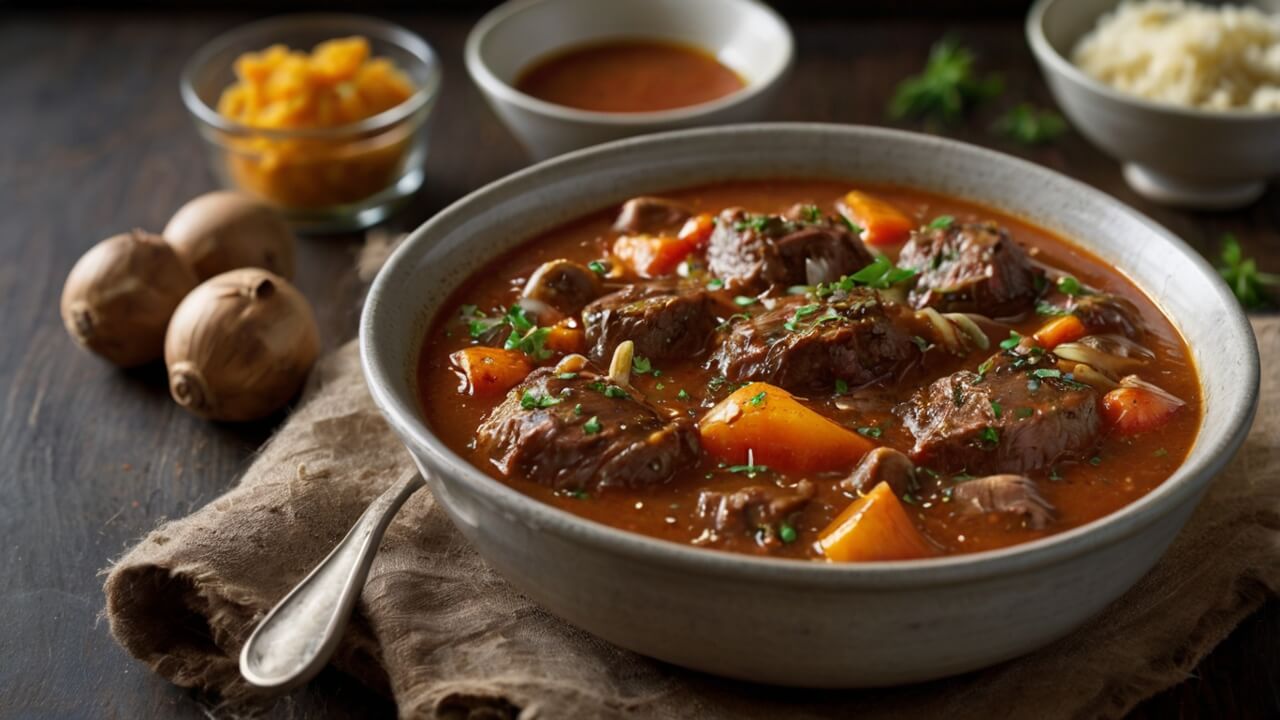
Cilantro Lime AIP Chicken Vegetable Soup
This vibrant and flavorful soup is a perfect one-pot meal for the slow cooker. Tender chicken, nutrient-dense vegetables, and a zesty cilantro-lime broth come together in a delightful AIP-compliant dish.
Ingredients:
- 1 lb boneless, skinless chicken breasts
- 4 cups chicken broth
- 1 cup diced carrots
- 1 cup diced celery
- 1 cup diced zucchini
- 1 cup diced sweet potato
- 1 onion, diced
- 3 cloves garlic, minced
- 1 jalapeño, seeded and minced (optional for heat)
- 1 tsp ground cumin
- 1 tsp dried oregano
- 1/2 cup fresh cilantro, chopped
- Juice of 2 limes
- Sea salt and black pepper, to taste
Preparation:
- Place all ingredients except cilantro and lime juice in the slow cooker.
- Cook on low for 6-8 hours or high for 3-4 hours.
- Remove chicken breasts and shred with two forks.
- Return shredded chicken to the slow cooker.
- Stir in fresh cilantro and lime juice.
- Adjust seasoning with salt and pepper as needed.
Budget-Friendly Crockpot Chicken
This simple and economical recipe transforms humble ingredients into a delicious and comforting meal. Perfect for meal prep or busy weeknights.
Ingredients:
- 1 lb boneless, skinless chicken breasts or thighs
- 1 cup chicken broth or bone broth
- 1 onion, diced
- 2 carrots, sliced
- 2 celery stalks, sliced
- 2 cloves garlic, minced
- 1 tsp dried thyme
- 1 tsp dried rosemary
- Sea salt and black pepper, to taste
Preparation:
- Place all ingredients in the slow cooker.
- Cook on low for 6-8 hours or high for 3-4 hours.
- Remove chicken and shred or slice.
- Serve chicken with vegetables and cooking liquid.
Chicken and Pumpkin Soup
This comforting and nutrient-dense soup is perfect for cooler weather. The combination of chicken, pumpkin, and warming spices creates a delightful and AIP-friendly meal.
Ingredients:
- 1 lb boneless, skinless chicken breasts
- 4 cups chicken broth
- 1 (15 oz) can pumpkin puree or 2 cups fresh pumpkin puree
- 1 onion, diced
- 2 carrots, sliced
- 2 celery stalks, sliced
- 2 cloves garlic, minced
- 1 tsp ground cinnamon
- 1/2 tsp ground ginger
- 1/4 tsp ground nutmeg
- Sea salt and black pepper, to taste
- Coconut cream or coconut milk (optional, for creamier texture)
Preparation:
- Place all ingredients except coconut cream/milk in the slow cooker.
- Cook on low for 6-8 hours or high for 3-4 hours.
- Remove chicken and shred or slice.
- Return chicken to the slow cooker and stir in coconut cream/milk if desired.
- Adjust seasoning with salt and pepper as needed.
Easiest Crock Pot Chicken Teriyaki
This simple teriyaki chicken recipe is a crowd-pleaser and perfect for busy nights. Serve over cauliflower rice or zucchini noodles for an AIP-compliant meal.
Ingredients:
- 1 lb boneless, skinless chicken breasts or thighs
- 1/2 cup coconut aminos
- 1/4 cup apple cider vinegar
- 2 tbsp honey
- 2 cloves garlic, minced
- 1 tsp ground ginger
- 1/4 tsp red pepper flakes (optional for heat)
- 2 green onions, sliced (for garnish)
- Sesame seeds (for garnish, optional)
Preparation:
- Place chicken in the slow cooker.
- In a small bowl, whisk together coconut aminos, apple cider vinegar, honey, garlic, ginger, and red pepper flakes (if using).
- Pour the sauce over the chicken.
- Cook on low for 6-8 hours or high for 3-4 hours.
- Remove chicken from the slow cooker and shred or slice.
- Serve chicken with the cooking sauce, garnished with green onions and sesame seeds (if using).
Lamb Recipes
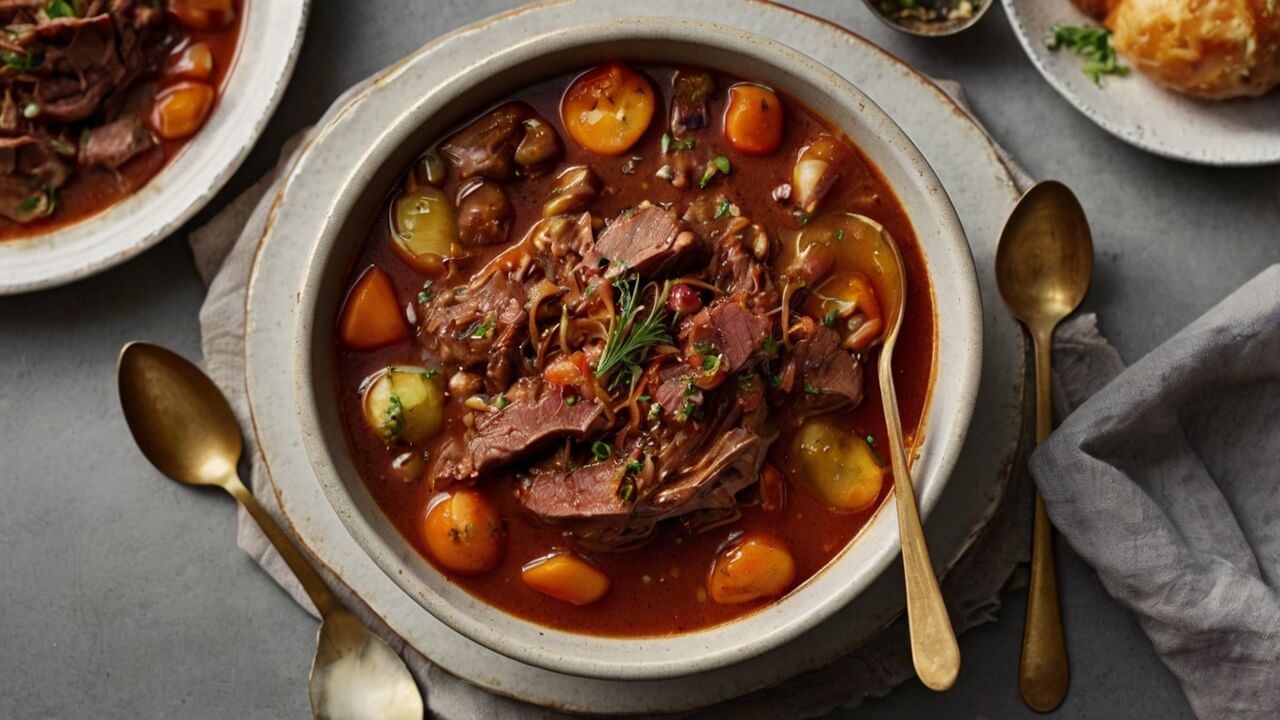
Slow Cooker Herbed Lamb Shanks
These fall-off-the-bone tender lamb shanks are cooked in a flavorful broth of bone broth, fresh herbs, and aromatic vegetables. Perfectly AIP-compliant and delicious!
Ingredients:
- 4 lamb shanks
- 2 cups bone broth
- 1 onion, diced
- 4 carrots, sliced
- 4 celery stalks, sliced
- 4 cloves garlic, minced
- 2 sprigs fresh rosemary
- 4 sprigs fresh thyme
- 2 bay leaves
- Salt and pepper to taste
Instructions:
- Season the lamb shanks generously with salt and pepper.
- Place the shanks in the slow cooker and add the bone broth, onion, carrots, celery, garlic, rosemary, thyme, and bay leaves.
- Cover and cook on low for 7-8 hours or on high for 4-5 hours, until the meat is fall-off-the-bone tender.
- Remove the shanks from the slow cooker and discard the herbs. Use a slotted spoon to transfer the vegetables to a serving dish.
- If desired, thicken the cooking liquid by mixing 2 tablespoons arrowroot powder with 1/4 cup cold water and whisking it into the hot liquid. Cook for 5-10 minutes until thickened.
- Serve the lamb shanks over the vegetables, drizzled with the thickened cooking liquid.
Slow Cooker Moroccan Lamb Stew
This flavorful and aromatic stew is loaded with tender lamb, sweet potatoes, and warm spices like cinnamon and cumin. It’s a comforting and nutrient-dense AIP meal.
Ingredients:
- 2 lbs lamb stew meat, cut into 1-inch pieces
- 2 sweet potatoes, peeled and diced
- 1 onion, diced
- 4 cloves garlic, minced
- 2 cups bone broth
- 1 (14 oz) can coconut milk
- 2 tsp ground cinnamon
- 2 tsp ground cumin
- 1 tsp ground ginger
- 1 tsp salt
- 1/4 tsp cayenne pepper (optional)
- 2 cups baby spinach or kale, chopped
- 1/4 cup fresh cilantro, chopped
Instructions:
- In the slow cooker, combine the lamb, sweet potatoes, onion, garlic, bone broth, coconut milk, cinnamon, cumin, ginger, salt, and cayenne pepper (if using).
- Cover and cook on low for 7-8 hours or on high for 4-5 hours.
- During the last 30 minutes of cooking, stir in the chopped spinach or kale and fresh cilantro.
- Serve the stew hot, optionally garnished with additional fresh cilantro.
These two lamb recipes are sure to satisfy your cravings for flavorful and comforting AIP-friendly meals. The slow cooker makes them incredibly easy to prepare, and the ingredients are all compliant with the Autoimmune Protocol guidelines.
AIP-Compliant Side Dishes and Snacks
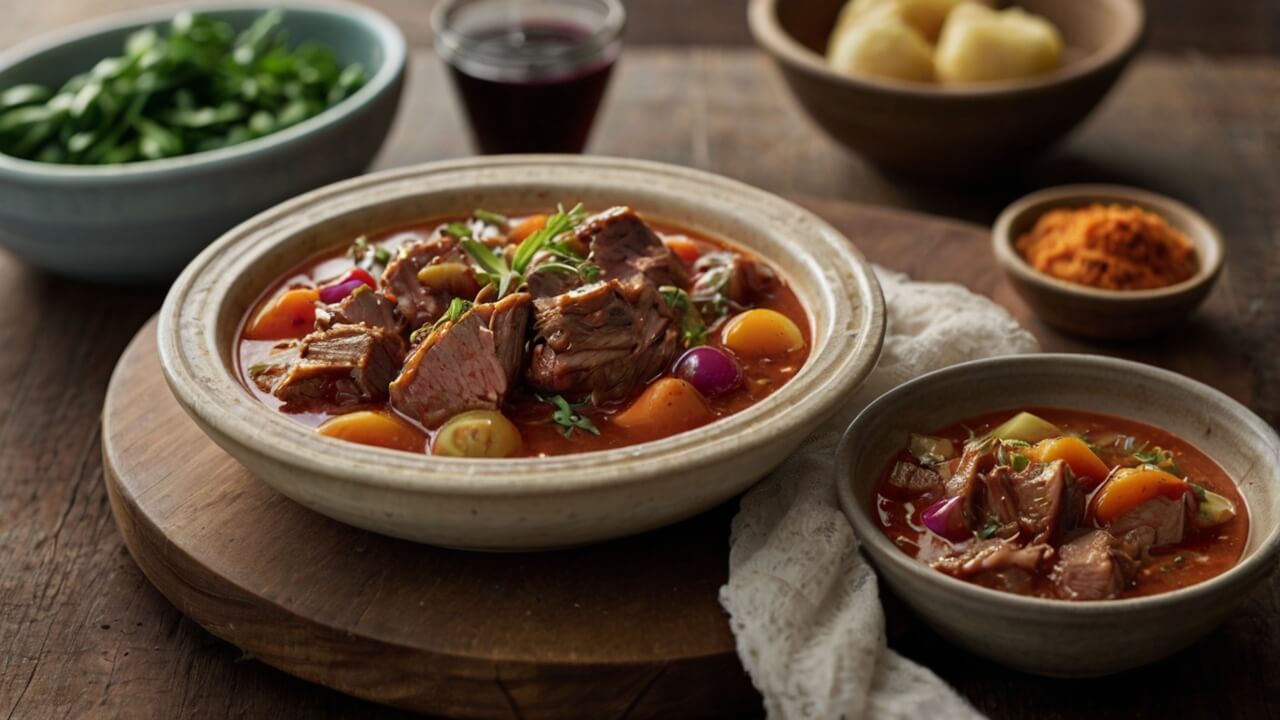
Garlic Cauliflower Mash
Ingredients:
- 1 large head of cauliflower, cut into florets
- 4 cloves garlic, minced
- 1/2 cup coconut milk
- 2 tablespoons olive oil or avocado oil
- 1 teaspoon sea salt
- 1/4 teaspoon black pepper
Instructions:
- Place the cauliflower florets and minced garlic in the slow cooker.
- Pour in the coconut milk and drizzle with olive oil or avocado oil. Season with salt and pepper.
- Cook on low for 6-8 hours, or until the cauliflower is very tender.
- Use an immersion blender or transfer the cooked cauliflower to a food processor and blend until smooth and creamy.
Baked Apples with Cinnamon Coconut Cream
Ingredients:
- 4 medium apples, cored and sliced
- 1/4 cup coconut cream
- 1 teaspoon ground cinnamon
- 1 tablespoon honey or maple syrup (optional)
- 1/4 cup water
Instructions:
- Place the sliced apples in the slow cooker and pour the water over them.
- In a small bowl, mix together the coconut cream, cinnamon, and honey or maple syrup (if using).
- Pour the coconut cream mixture over the apples and gently toss to coat.
- Cook on low for 4-6 hours, or until the apples are tender and the sauce has thickened.
Zucchini Bacon Bites
Ingredients:
- 3 medium zucchinis, sliced into 1/4-inch rounds
- 8 slices of AIP-compliant bacon, cooked and crumbled
- 2 tablespoons coconut aminos
- 1 tablespoon apple cider vinegar
- 1 teaspoon garlic powder
- 1/4 teaspoon sea salt
Instructions:
- Arrange the zucchini slices in the slow cooker, overlapping them slightly.
- In a small bowl, whisk together the coconut aminos, apple cider vinegar, garlic powder, and sea salt.
- Pour the sauce over the zucchini slices and sprinkle with the crumbled bacon.
- Cook on low for 4-6 hours, or until the zucchini is tender but still holds its shape.
These AIP-compliant side dishes and snacks are perfect for adding variety to your meals while staying within the dietary guidelines of the Autoimmune Protocol. Enjoy them as a delicious accompaniment to your main dishes or as a satisfying snack throughout the day.
Frequently Used AIP Ingredients
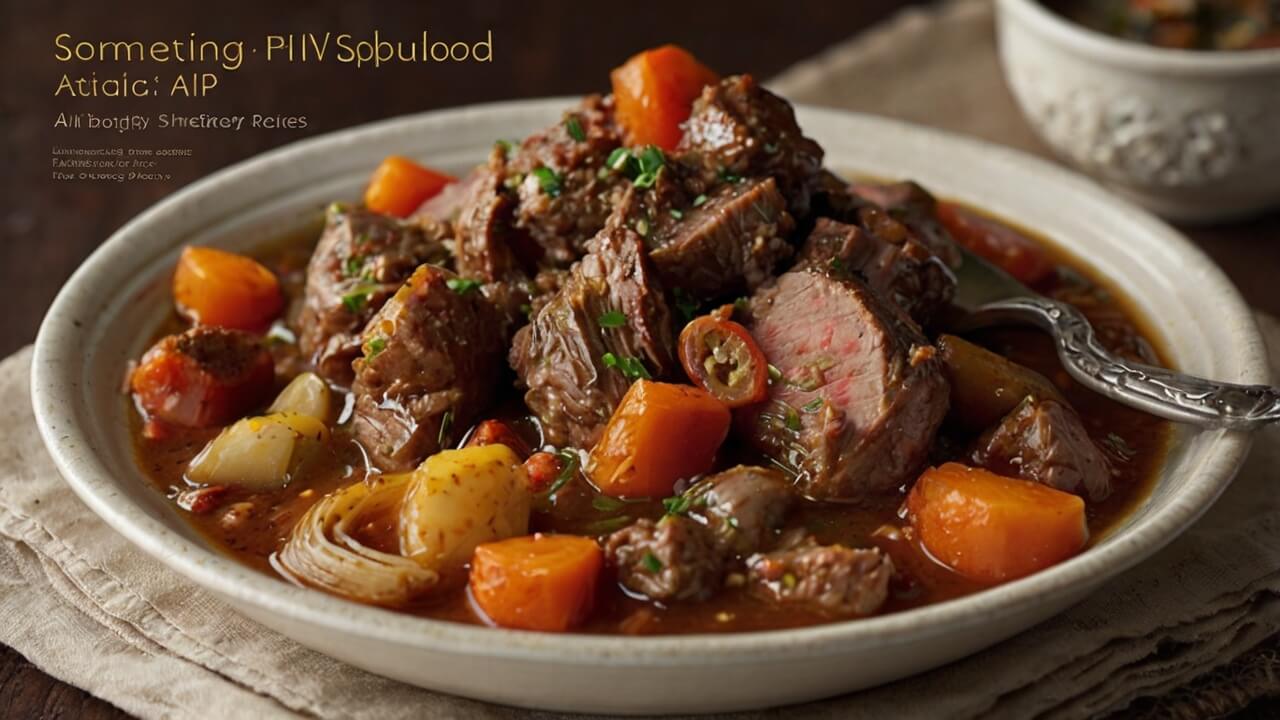
In AIP slow cooker recipes, a variety of nutrient-dense ingredients are commonly used to create flavorful and compliant dishes. Here are some frequently used ingredients and their benefits:
Bone Broth: Bone broth is a staple in the AIP diet, providing a rich source of collagen, minerals, and amino acids. It serves as an excellent base for soups, stews, and sauces, adding depth of flavor and nutrition.
Coconut Products: Coconut milk, coconut oil, and coconut aminos are versatile ingredients that add richness, creaminess, and a subtle sweetness to AIP dishes. They are also dairy-free and compliant with the AIP guidelines.
Herbs and Spices: Fresh herbs like cilantro, parsley, thyme, and rosemary, as well as spices like turmeric, ginger, and cinnamon, are essential for adding flavor and depth to AIP slow cooker recipes without relying on nightshades or other restricted ingredients.
Vegetables: A variety of nutrient-dense vegetables, such as sweet potatoes, carrots, zucchini, and leafy greens, are commonly used in AIP slow cooker recipes. They provide fiber, vitamins, and minerals while adding flavor and texture to dishes.
Fruit: Fruits like oranges, lemons, limes, and berries are often used to add natural sweetness, tanginess, and depth of flavor to AIP slow cooker recipes. They also contribute valuable antioxidants and vitamins.
Healthy Fats: Avocado oil, olive oil, and ghee (clarified butter) are AIP-compliant fats that can be used for sautéing, roasting, or adding richness to dishes. These healthy fats are essential for nutrient absorption and overall satiety.
By combining these nutrient-dense ingredients in creative ways, you can create delicious and satisfying AIP slow cooker meals that support your body’s healing process and overall well-being.
AIP-Compliant Ingredients for Thickening Sauces and Gravies
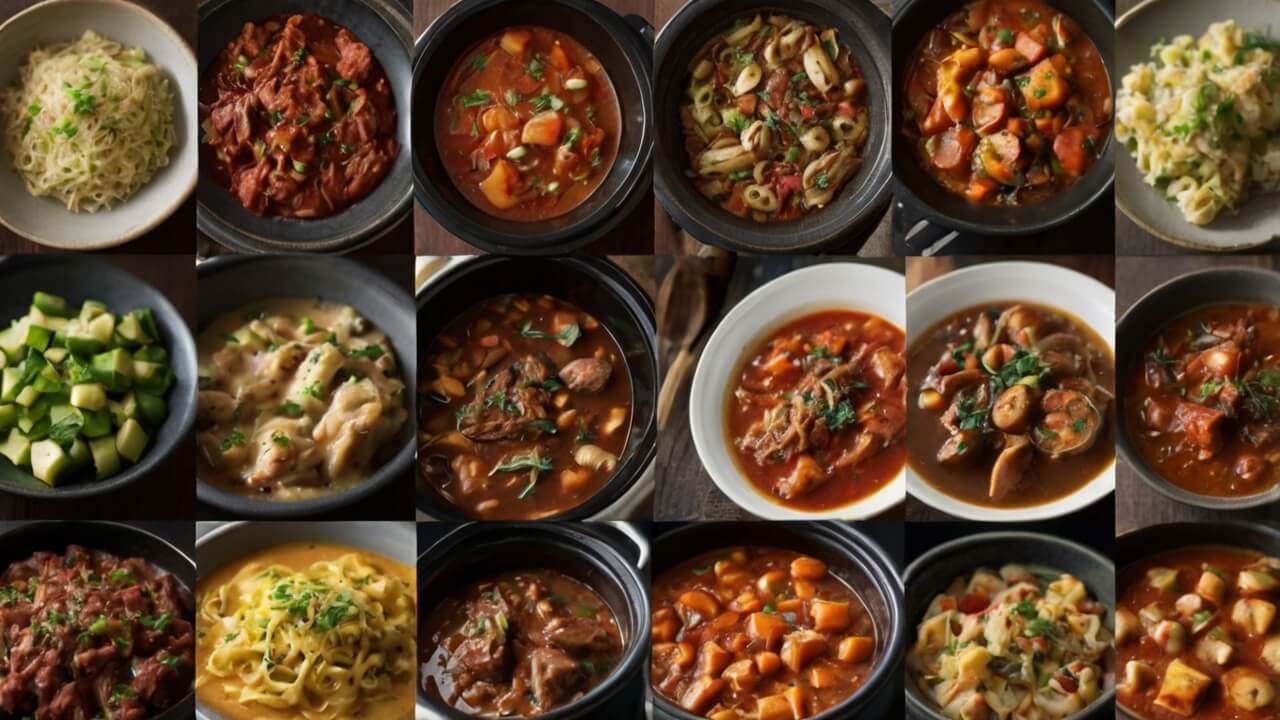
Slow cooker recipes often result in deliciously tender meats and flavorful broths, but sometimes the sauces or gravies can be a bit thin. Fortunately, there are several AIP-compliant ingredients and techniques you can use to thicken up your slow cooker sauces and gravies without compromising on taste or autoimmune protocol guidelines.
Arrowroot Powder or Tapioca Starch: These starches are excellent thickeners for sauces and gravies. Mix a small amount (1-2 tablespoons) with an equal amount of cold liquid until smooth, then whisk it into the hot liquid in your slow cooker during the last 30 minutes of cooking.
Coconut Flour: This gluten-free flour can be used to thicken sauces and gravies. Sprinkle a small amount (1-2 tablespoons) into the hot liquid and whisk continuously until it reaches the desired consistency.
Pureed Vegetables: Boiled and pureed vegetables like cauliflower, zucchini, or sweet potatoes can add body and thickness to sauces and gravies. Simply blend them until smooth and stir them into the slow cooker during the last 30 minutes of cooking.
Gelatin or Collagen Powder: These ingredients can help thicken sauces and gravies while also providing additional protein and nutrients. Sprinkle a small amount (1-2 tablespoons) into the hot liquid and whisk until dissolved and thickened.
Reduction: If you have the time, you can allow the sauce or gravy to simmer uncovered on the stovetop or in the slow cooker on the “warm” setting to reduce and thicken through evaporation.
Remember, when thickening sauces or gravies, it’s best to start with a small amount of thickener and gradually add more as needed, whisking continuously to prevent lumps from forming. With these AIP-compliant ingredients and techniques, you can achieve the perfect consistency for your slow cooker masterpieces.
Ensuring AIP Compliance
When following the Autoimmune Protocol (AIP) diet, it’s crucial to ensure that your slow cooker recipes are fully compliant with the dietary guidelines. One of the key aspects of AIP is avoiding nightshade vegetables, such as tomatoes, potatoes, eggplants, and peppers, as they can potentially trigger inflammation in some individuals.
To ensure your slow cooker recipes are nightshade-free, be mindful of the ingredients you use. Instead of tomato-based sauces or dishes with potatoes, consider using compliant alternatives like pureed carrots, pumpkin, or beets for a rich, flavorful base. Swap out bell peppers for diced fennel or zucchini, and use fresh herbs and spices like garlic, ginger, and turmeric to add depth of flavor.
Additionally, it’s essential to avoid processed foods, grains, legumes, dairy, and any potential food allergens or sensitivities. When preparing AIP slow cooker meals, opt for high-quality proteins, nutrient-dense vegetables, and healthy fats like avocado oil, coconut oil, or olive oil.
By carefully selecting your ingredients and following the AIP guidelines, you can create delicious, nutrient-rich slow cooker meals that support your body’s healing process and overall well-being.
Meal Prepping AIP-Friendly Dishes with a Slow Cooker
The slow cooker is an invaluable tool for those following the Autoimmune Protocol (AIP) diet. Not only does it allow you to prepare delicious, nutrient-dense meals with minimal effort, but it also makes meal prepping for the week ahead a breeze. By dedicating a few hours on the weekend to batch cooking, you can have a fridge full of AIP-compliant dishes ready to enjoy throughout the busy week.
One effective strategy is to prepare a large batch of protein, such as a whole chicken or a pork shoulder, in the slow cooker. Once cooked, you can shred or slice the meat and portion it into individual servings. These can then be combined with various AIP-friendly vegetables, sauces, and seasonings to create a variety of meals.
Another approach is to cook a large batch of soup or stew in the slow cooker. These hearty dishes can be easily portioned into individual servings and reheated throughout the week. Soups and stews are also an excellent way to incorporate a variety of nutrient-dense vegetables and bone broth into your diet.
When meal prepping with a slow cooker, it’s essential to use AIP-compliant ingredients and avoid any potential food triggers. This means steering clear of nightshades, grains, legumes, dairy, and processed foods. Instead, focus on incorporating nutrient-dense ingredients like grass-fed meats, vegetables, fruits, healthy fats, and herbs and spices.
To streamline the meal prep process, consider investing in high-quality, reusable food storage containers. These will not only help you portion out your meals efficiently but will also reduce waste and ensure your food stays fresh for longer.
Remember, the key to successful meal prepping is planning ahead and being organized. Take some time on the weekend to plan your meals for the week, make a grocery list, and batch cook your AIP-friendly dishes in the slow cooker. With a little preparation, you’ll have a fridge full of delicious, nutritious meals ready to enjoy, making it easier to stick to your AIP diet during the busy week ahead.
Potential Challenges or Pitfalls when Slow Cooking AIP Meals With Solutions
While slow cooking is an excellent method for preparing AIP-compliant meals, there are a few potential challenges and pitfalls to be aware of. Here are some common issues and solutions to help ensure your slow cooker recipes turn out perfectly every time:
Overcooking: One of the biggest pitfalls of slow cooking is the risk of overcooking ingredients, leading to a mushy or dry texture. To avoid this, it’s essential to follow recipe instructions carefully and adjust cooking times as needed based on your specific slow cooker model and desired level of doneness.
Lack of Flavor: Some slow cooker recipes can turn out bland or one-dimensional in flavor due to the long cooking process. To combat this, consider adding aromatic herbs, spices, and citrus zests towards the end of the cooking time to preserve their vibrant flavors. You can also experiment with AIP-compliant marinades or sauces to infuse your dishes with more depth and complexity.
Food Safety Concerns: Slow cookers operate at lower temperatures, which can potentially allow harmful bacteria to thrive if food is left in the “danger zone” (between 40°F and 140°F) for too long. To mitigate this risk, always ensure that your ingredients are fully cooked before serving, and avoid letting food sit at room temperature for extended periods before or after cooking.
Lack of Browning or Crisping: One limitation of slow cookers is their inability to achieve the browning or crisping effect that you can get from other cooking methods. To add texture and depth of flavor, consider searing or browning your proteins before adding them to the slow cooker, or broiling or sautéing vegetables for a few minutes before serving.
Liquid Ratios: Getting the right liquid ratio in your slow cooker recipes is crucial. Too little liquid can lead to dryness, while too much can result in a watery consistency. Follow recipe instructions carefully, and adjust liquid amounts as needed based on your desired consistency and the type of ingredients used.
By being mindful of these potential challenges and implementing the provided solutions, you can ensure that your AIP slow cooker meals turn out delicious, flavorful, and perfectly cooked every time.
Benefits of AIP Slow Cooking
Embracing the Autoimmune Protocol (AIP) diet can be a transformative journey towards better health, but it often comes with the challenge of finding convenient and delicious meal options that strictly adhere to the dietary guidelines. Fortunately, slow cooking emerges as a game-changer, offering a multitude of benefits that make it an ideal companion for those following the AIP lifestyle.
Effortless Meal Prep: One of the most significant advantages of slow cooking is its hands-off approach. With minimal preparation time, you can toss your ingredients into the slow cooker in the morning and return to a fully cooked, flavorful meal in the evening. This convenience is invaluable for those with busy schedules or those struggling with fatigue, a common symptom of autoimmune conditions.
Nutrient Preservation: Slow cooking is a gentle method of preparation that preserves the natural nutrients and enzymes in foods. Unlike high-heat cooking methods, which can degrade vitamins and minerals, the low and consistent temperatures used in slow cooking help retain the nutritional integrity of your ingredients, ensuring you get the most out of your AIP-friendly meals.
Flavor Infusion: The prolonged cooking time in a slow cooker allows flavors to meld and intensify, resulting in incredibly rich and satisfying dishes. The slow and steady process breaks down tough cuts of meat, making them incredibly tender and infusing them with the aromatic spices and herbs used in the recipe.
Batch Cooking Ease: Slow cookers are designed to accommodate larger portions, making them perfect for batch cooking. Preparing larger quantities of AIP-compliant meals in advance can save you time and effort throughout the week, ensuring you always have a nutritious and delicious meal on hand, even on your busiest days.
Cost-Effective: Slow cookers are energy-efficient appliances that consume less electricity than conventional ovens or stovetops. Additionally, you can often use inexpensive cuts of meat, which become incredibly tender and flavorful when slow-cooked, making it an economical choice for those on a budget.
By embracing the convenience and benefits of slow cooking, you can seamlessly integrate the Autoimmune Protocol into your lifestyle, enjoying delicious, nutrient-dense meals without compromising your dietary restrictions or sacrificing valuable time and energy.
Conclusion
The Autoimmune Protocol (AIP) diet can be challenging, but with the convenience of a slow cooker, you can create delicious and compliant meals without sacrificing flavor or spending hours in the kitchen.
These AIP slow cooker recipes offer a variety of options for meat lovers and vegetarians alike, ensuring that you can enjoy nourishing and satisfying dishes while adhering to your dietary needs.
We encourage you to try these recipes and experiment with different ingredients and flavors. Don’t be afraid to get creative and make adjustments to suit your personal preferences.
Cooking should be an enjoyable experience, and with the right tools and recipes, you can transform your AIP journey into a culinary adventure.
If you’ve tried any of these recipes or have your own AIP slow cooker creations to share, we’d love to hear from you. Your experiences and insights can help fellow AIP followers discover new and exciting meal options.

